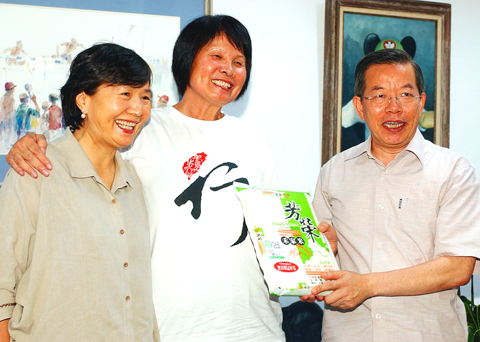President Ma Ying-jeou (馬英九) said yesterday that China's change of heart regarding the Taiwanese Olympic team's designation was a significant development in diplomacy and that he would explore his proposal of a "diplomatic truce" with Beijing next week.
“China’s official news agencies no longer refer to Taiwan as Zhongguo Taibei (中國台北, or Taipei, China). This would have been hard to achieve if it were not for the government’s efforts on cross-strait relations over the last two months,” Ma said while meeting Stephen Waters, the representative of the Australian Commerce and Industry Office in Taipei, at the Presidential Office.
Ma made the remarks in the wake of recent controversy surrounding the title of Taiwan’s Olympic team and the arrangements for the opening ceremony procession next month.

PHOTO: CNA
Beijing has decided to use Zhonghua Taibei (中華台北, or Chinese Taipei) — rather than the Zhongguo Taibei it had arbitrarily adopted earlier in the Chinese media — to refer to “Chinese Taipei,” the official title used by Taiwan at the Olympics, and to arrange the opening procession next Friday based on the number of strokes in the first character of each country or territory’s name in simplified Chinese.
Under this system, Taiwan will be the 24th team to enter the stadium after Japan and before the Central African Republic and Hong Kong.
Ma said China’s decision on the Taiwanese Olympic team’s name was “a development carrying significant meaning,” adding that it was the result of a consensus reached by both sides of the Taiwan Strait.
He told Waters that his administration had been seeking to put an end to the vicious competition across the Taiwan Strait by promoting cross-strait relations and a “diplomatic truce” with China.
Meanwhile, former Democratic Progressive Party (DPP) chairman Frank Hsieh (謝長廷) and former secretary-general of the Presidential Office Yeh Chu-lan (葉菊蘭) paid a visit to former Olympic medalist Chi Cheng (紀政) yesterday.
“We need not to request, we need not to beg, it is our right [to join the procession] under the “T” section,” Chi told reporters.
“We have felt wronged for the treatment we have received in other Olympic Games for years, and we should let the international community know the injustice and wrong we have taken along the way,” she said.
Cheng Wen-tsang (鄭文燦), the director of the DPP’s Department of Culture and Information, agreed, telling a separate press conference that if Beijing refused to let Taiwan march under the “T” section, Taiwan’s Olympic team should not join the opening parade and Taiwanese government officials and political figures should not attend the opening ceremony.
DPP Legislator Kuan Bi-ling (管碧玲) said that Wu Ching-kuo (吳經國), Taiwan’s representative to the IOC, should be held accountable.
In a related development, the Chinese Taipei Paralympics Committee yesterday said Taiwan’s Paralympic team would consider boycotting the Beijing Paralympic Games opening ceremony next month if China fails to list the team under the “T” section.
Lai Fau-hwan (賴復寰), director of the committee, said Taiwan’s Paralympic team would insist on the original arrangement of the Game’s opening procession based on the protocol signed in 1981 between the Chinese Taipei Olympic Committee and the IOC.
ADDITIONAL REPORTING BY STAFF WRITER

The manufacture of the remaining 28 M1A2T Abrams tanks Taiwan purchased from the US has recently been completed, and they are expected to be delivered within the next one to two months, a source said yesterday. The Ministry of National Defense is arranging cargo ships to transport the tanks to Taiwan as soon as possible, said the source, who is familiar with the matter. The estimated arrival time ranges from late this month to early next month, the source said. The 28 Abrams tanks make up the third and final batch of a total of 108 tanks, valued at about NT$40.5 billion

Travel agencies in Taiwan are working to secure alternative flights for travelers bound for New Zealand for the Lunar New Year holiday, as Air New Zealand workers are set to strike next week. The airline said that it has confirmed that the planned industrial action by its international wide-body cabin crew would go ahead on Thursday and Friday next week. While the Auckland-based carrier pledged to take reasonable measures to mitigate the impact of the workers’ strike, an Air New Zealand flight arriving at Taipei from Auckland on Thursday and another flight departing from Taipei for Auckland on Saturday would have to

A group from the Taiwanese Designers in Australia association yesterday represented Taiwan at the Midsumma Pride March in Melbourne. The march, held in the St. Kilda suburb, is the city’s largest LGBTQIA+ parade and the flagship event of the annual Midsumma Festival. It attracted more than 45,000 spectators who supported the 400 groups and 10,000 marchers that participated this year, the association said. Taiwanese Designers said they organized a team to march for Taiwan this year, joining politicians, government agencies, professionals and community organizations in showing support for LGBTQIA+ people and diverse communities. As the first country in Asia to legalize same-sex

MOTIVES QUESTIONED The PLA considers Xi’s policies toward Taiwan to be driven by personal considerations rather than military assessment, the Epoch Times reports Chinese President Xi Jinping’s (習近平) latest purge of the Chinese People’s Liberation Army (PLA) leadership might have been prompted by the military’s opposition to plans of invading Taiwan, the Epoch Times said. The Chinese military opposes waging war against Taiwan by a large consensus, putting it at odds with Xi’s vision, the Falun Gong-affiliated daily said in a report on Thursday, citing anonymous sources with insight into the PLA’s inner workings. The opposition is not the opinion of a few generals, but a widely shared view among the PLA cadre, the Epoch Times cited them as saying. “Chinese forces know full well that